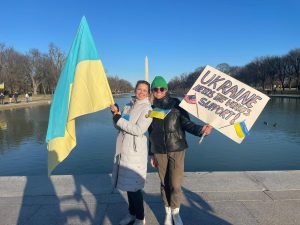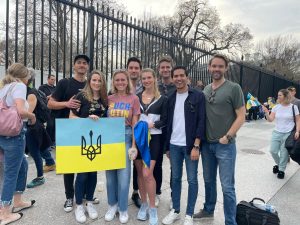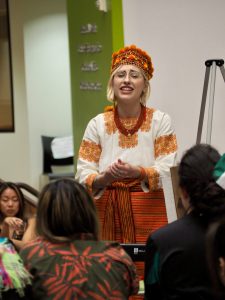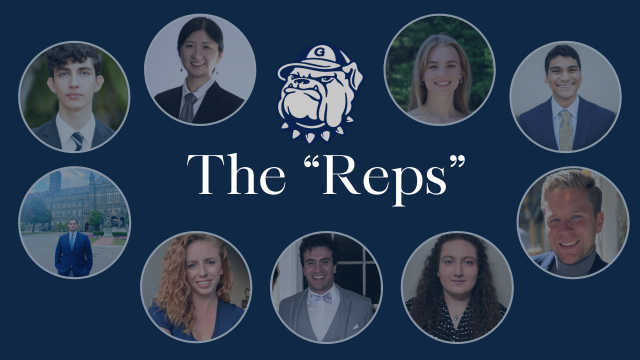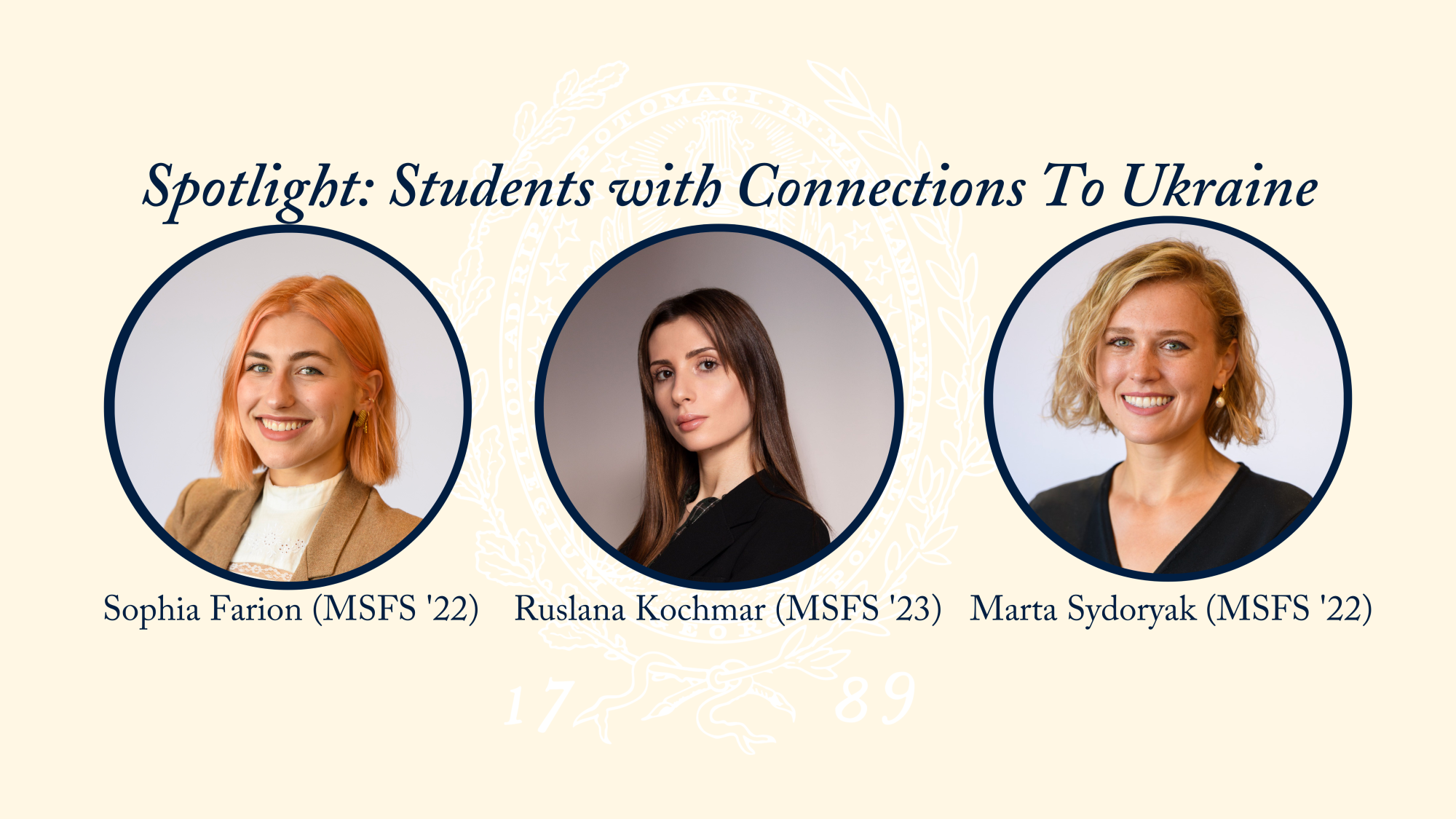
Title: Student Spotlight: Sophia Farion, Ruslana Kochmar, Marta Sydoryak
 Sophia Farion
Sophia Farion
Sophia Farion is a second year MSFS candidate concentrating in Global Politics and Security (GPS) with a certificate in Gender, Peace, and Security. She grew up in Philadelphia in the Ukrainian diaspora community. Her studies at Georgetown and work through internships has centered around gender and it’s intersection with the UN security council Resolution 1325 on women, peace and security. Sophia came to Georgetown to broaden her understanding beyond a regional focus and gain a more holistic, intersectional understanding of international relations. The war in Ukraine has brought Sophia’s attention back to Ukraine and to her Ukrainian heritage. She is taking the strengths she has with her background in Ukraine and intersecting them with peace and gender. After graduation, Sophia hopes to take some time to help with humanitarian aid– particularly with women, refugees, and resettlement–in Poland. Long term, Sophia hopes to apply her studies to advance gender equality and women’s empowerment.
What is your connection to Ukraine?
All four of my grandparents are from Western Ukraine and escaped from Ukraine during WWII during their youth. As displaced refugee children, holding on to their homeland and their heritage was very important to them and this was very much instilled in my parents as well. It was instilled in my as I grew up as well. Ukrainian was the first language I heard in my house, I cooked Ukrainian food, sang Ukrainian songs, learn Ukrainian arts such as embroidery. I learned all these things from my grandmothers and my grandfathers.
Growing up in Philadelphia and the Ukrainian diaspora community there, I felt there was a sort of romanticism around the homeland, which I think transcends all diaspora communities. I was always weary of that so I decided to go to Ukraine on a Fulbright scholarship to teach English in Ivano-Frankivsk and worked and traveled all over the country. This was very formative for me and how I identify as a Ukrainian-American.
I still have family in Lviv and have been in touch with them during all this. My cousin recently sent me a photo of all of us together for Easter. It’s crazy to see this photo and realize four years ago today, we were just hanging out on a sunny day and now my uncle is doing military patrols and my cousin is helping weave camouflage protection. It feels very unreal and it hits close to home.
I also have friends in capital who refuse to leave because they are wonderfully stubborn Ukrainians. I have friends who left. My aunt and uncle happened to be in the U.S. when the war started and they recently went back to Poland to take care of their grandchildren.
I’m lucky to have my friends who also went on Fulbright to Ukraine. Dealing with the war has been exhausting and having each other here and being able to tell stories of Ukraine without having to explain everything has been very helpful. There’s a lot of solidarity around that.
How have you been involved in raising awareness of the war in Ukraine/supporting the Ukrainian community during this difficult time?
It’s been bizarre to me walking around DC or other cities and seeing blue and yellow flags everywhere. I grew up having to explain where “the Ukraine” is and that it’s not “the Ukraine,” it’s just Ukraine. It’s a sovereign state and its in Eastern Europe. It’s the bread basket of Europe. So, 12-year old me would be aghast seeing all of this. It’s an awful reason for people to gain awareness of Ukraine, but it’s just wild.
When the current conception of the war started — and I always have to remind people that this is not an invasion, it’s a continued invasion that started in 2014 — I took to social media. I tried to post as many resources as possible, I started a fundraiser that went to funding medical supplies for Ukraine through Razom for Ukraine, which is an organization that has been doing a lot of great work sending supplies to Ukraine via Poland.
The things that have been most fruitful to me have been threefold: Firstly, I have tried to hold a space for my friends for whom this war is much closer. Even though this is my heritage and my identity, I have a little more distance. Because of the privilege of having that mental space, I’ve been trying to help those for whom this war is overwhelmingly too close to home. So, after protests I’ve been inviting friends over and cooking a big meal for them and creating a safe bubble for those who lived in Ukraine, worked in Ukraine, and know Ukraine.
Secondly, my father (a military historian by avocation) has been doing daily or near daily updates on the war, as he possesses an immense wealth of knowledge about past wars in Ukraine and the current tactical situation and operational stage in Ukraine. For the first week or two, I posted these updates on my Instagram. Later on, I helped him create a newsletter which he sends out every other day. It has a very detailed map that he updates. So, being my dad’s PR and marketing team has been very interesting. I also had my dad do a zoom lecture on what was going on.
Thirdly, I had a bunch of people come over and we made the traditional Ukrainian dish Varenyky (basically pierogies) and brought them to MSFS International Night. I just wanted to show that Ukrainians have a very dark sense of humor but are very stubborn and always want to have a good time. So I wanted to show that part of what it means to be Ukrainian in a war. Because that still shines through and the strength of the Ukrainian people is not only inspiring to the rest of the world, but it’s inspiring to me and those associated closely with Ukraine. There are babies being born metro bomb shelters, there is music being sung in bombed buildings, there’s an insatiable life that flows through every Ukrainian and that never goes away.
Any advice for how the Georgetown community can support the Ukrainian people at this time?
Eventually [this war] will not be the front headline. Eventually it won’t be the first thing on the intelligence daily podcast. But there are still people dying, there are still people scraping to survive, there being subjected to rape as a weapon of war, there are people whose identity is being ripped away from them. Even if it’s not in the headlines, it’s going to be happening. And this is happening all over the world. This isn’t unique to Ukraine. There’s Afghanistan, there’s Syria, there’s Venezuela. I think having solidarity with people, countries, nationalities and diaspora communities that are also struggling and figuring out how we can support each other and create a system of global order that not only find solutions to peace soon but sustainable peace to ensure that war criminals can’t come to power is important.
Also, Ukrainians are some of the most creative people. There is so much cool Ukrainian art. There are artists that are now refugees. You can support them and buy their art, listen to their music, read translated Ukrainian poetry. There’s Ukrainian scientists looking for fellowships. If you can connect people, connect people. They just want a place to lay their head down and eventually go home.
 Ruslana Kochmar
Ruslana Kochmar
Ruslana is a first-year graduate MSFS student concentrating in Science, Technology, and International Affairs (STIA). She hails from Odesa, Ukraine.
How have your past experiences shaped your studies in international relations and how are they connected to your home country, Ukraine?
When I was 14 years, my dad asked me whether I want to take a new outlook on what the educational and career environment abroad is like. It was a casual and pretty random offer, which fully alternated my whole life as a result. Up until today, I couldn’t be more grateful for this journey, which involved a full range of “checkpoints”, including the UK, Austria, and recently Spain, where I obtained my bachelor’s degree.
Since 2014, the outgoing war in Ukraine initiated my interest in diplomacy, conflict mediations, as well as national and defense security policies. Nevertheless, during my undergraduate program, I opened a new door for myself in the energy security field. The choice of my final thesis broadened my perspective of conventional security dilemmas and incentivized me to explore a more novel area in the green energy sector. Improving the regulatory environment and increasing the resilience of the energy supply will help Ukraine to achieve broad-based, resilient economic development as a means to sustain its democracy and national sovereignty.
Coming from a developing country to an advanced world at fifteen made a big impact on how I see the world. My attention was drawn to dissimilarities in welfare, social peace, and economic growth. But having the opportunity to travel to Europe and America was what gave me an insight into the reality of countries and not merely how the media portrays them.
The past international experience cultivated my ideological and political spectrum, encouraging me to pursue analytical and advocacy roles within my internships. Growing up as part of an age acutely affected by the government’s policies of austerity, I set myself a goal to change the outdated distrust of the local Ukrainian citizens in the government. In the future, I hope to continue connecting my admonitions in energy policy and politics – whether that be from the corridors of the embassy or the four walls of an affiliated business organization.
But, as a student who studies foreign affairs, I cannot ignore the power of sovereignty that is being questioned through historic agreements and partnerships. Just like President Zelenskiy stated: “It is very important to see now who our true friend and partner is and who will continue to scare Russia simply with words.” People should be able to negotiate, for this we were given a language, and for this, we were given all the voices. But people shouldn’t die. During times when you are withstanding an extremely compound and multiplex aggressor, smart diplomacy is paramount.
How have you been involved in raising awareness of the war in Ukraine/supporting the Ukrainian community during this difficult time?
I don’t believe that I am doing enough. Not yet….
In the beginning, I was participating, giving short speeches at protests, as well as gathering more people for rallies, which were organized by the NGO “Razom” and other “freelanced” volunteers. Mostly, I was acting as a translator, facilitator, or one of many intermediary contact points for accommodation and urgent requests. Luckily, I am grateful to have a broader international network, which enabled me to gather more inputs from old acquittances, as well as to connect to new people all over Europe. Most of my friends, who are doing a similar public outreach, are staying in touch in group chats on Signal to track and help each other from the distance.
Being caught up in this war while calling my mom at night was something that I will never forget. Since that day (surprisingly for myself), I began to indulge more in social media as my virtual platform for public advocacy. I found LinkedIn and Instagram useful and quick tools for promoting, raising awareness, gathering and sharing materials (documentation, regulations, contact numbers, refugees camps) with victims or other activists and public figures. This is the moment when I changed my negative perspective on social media as being a simply “procrastination tool”. I still remember how many people were reaching me and asking for resources and connections near Irpin for the group, which was trapped in the basement of a church that was on fire due to a missile strike.
Any advice for how the Georgetown community can support the Ukrainian people at this time?
I believe that Georgetown University could a note the following activities:
- boycotting companies still operating in Russia;
- signing ongoing petitions and forming new ones.
- Georgetown University could establish joint ventures for volunteering. I am also planning to reach out at the end of this semester DC-Area Bars and Restaurants, which are fundraising for Ukraine. For example, D Light Café & Bakery’s owners, Vira and Anastasia Derun, are Ukrainian and are donating funds.
- organizing exchange educational programs for displaced Ukrainians.
- establishing interactive discussion on policy recommendations, which could be delivered to the State Department and organized by the SFS community.
- establishing Task Force consisting of Georgetown law and journalist students to advance Russian sanctions and inform about war violations and breaches of international law.
- providing direct humanitarian assistance by selecting a specific aid (e.g., military assistance) or supplies to any relevant Ukrainian group (i.e., children, LQBTQI+).
 Marta Sydoryak
Marta Sydoryak
Marta is a second-year MSFS candidate concentrating in Global Politics and Security (GPS). She was born in Ukraine but grew up in Philadelphia. Growing up, she had close connections with Ukraine, returning to her birth country every summer, attending Ukrainian school every Saturday, taking part in Ukrainian Scouts, and learned traditional Ukrainian dancing.
She spent several years living and working in Ukraine. Last year, Marta took a leave of absence and spent the year in Ukraine working on a USAID project and the National Endowment for Democracy. After graduation, Marta is hoping to return to Ukraine and help respond to the crisis. Moving forward, she aspies to build her career around implementing a civil preparedness program in Ukraine. This was also the topic of her recent Orals examination, a requirement for graduation for MSFS students.
What is your connection to Ukraine?
I always had a very close connection to my homeland. I knew I would go back, and always wanted to live and work there. I just loved spending time there. I have my friends and my relatives, outside of my immediate family, who are all still in Ukraine. So, it was gut wrenching to watch them flee in search of safety. My former partner lives in Ukraine. We’re still very close. He was in Donbas in Eastern Ukraine when they started invading. I tracked his journey from Eastern to Western Ukraine and was on Facetime video with him as he took shelter in a bathtub. I could hear explosions in the background. I tracked similar journeys of my friends and family, including my seven year old cousin.
It was heartbreaking to see my two-year old goddaughter separated from her father. About my friends being forced to separate from their husbands, wives, children. I slowly watched a depressing transformation in every one of my friends who became impacted by the war.
Every single one of them now has PTSD. They don’t sleep much. They sleep in corridors. They continue working from bunkers every day. My friends’ mom’s partner set up a workspace for her mom in a bunker in Eastern Ukraine. He placed a table and a plant or something and it had a space for her laptop.
How have you been involved in raising awareness of the war in Ukraine/supporting the Ukrainian community during this difficult time?
Because I am a part of a vast civil society group in Ukraine–they know I am Ukrainian-American–I had a bunch of requests coming in. I started off quickly getting some non-lethal gear and supplies to my former partner and another close friend who was in a hot area. I worked on buying medical supplies through an organization called RAZOM. Then I switched over to a different team, as I was trying to figure out where I would be most useful. Razom has a team that works with children with disabilities, so we were helping evacuate them and get them access to medical care for their specific needs. Sometimes I woke up at 3:00am to talk to bus drivers who were transporting medical supplies to various cities. Basically, I was trying to help get humanitarian aid to where it needs to go, evacuating families, and buying medical supplies.
There were various other requests as well. Recently I received an email from a group looking for translators for hospitals that are helping Ukrainian refugees. I made a Facebook post targeting some Ukrainian-American doctors I know of and I now have a whole list of volunteers that I was able to send. Another example is a friend looking for a specific type of non-lethal drone. Again, I reached out to my contacts. Hopefully they’ll receive the drones soon. Every day there’s a different request coming in. And these are people I know well. These are my friends and my former colleagues. So even if I have nothing to do with drones, you figure it out, you try your best to help.
Any advice for how the Georgetown community can support the Ukrainian people at this time?
I have to say that my Georgetown friends have really, really showed up. Every single one of them. They took turns and participated in various protests. It was incredible. I can’t stress enough how important it was to have the presence and support of my MSFS community.
As with all conflicts, eventually “Ukraine fatigue” will set in. The rest of the world that doesn’t have ties to Ukraine will probably stop paying attention soon. I know there will be other events that will draw everyone’s attention and I understand that. It’s up to us to keep the fight going.
However, even as interest wanes, you could continue to check in on your Ukrainian friends because this is something that they will never stop caring about. This is something we’re going to carry for the rest of our lives. Keep checking in, keep yourself informed of the basics. If you can continue donating, keep donating. There will always be a need.
People lacking expertise and knowledge of the region tend to inaccurately apply their understanding of geopolitics. Context is important, inform yourself, not only of the current conflict but of Ukraine’s history. Try to understand why Russia seeks to exterminate Ukrainians, as we’ve seen with the Bucha genocide and shelling of Mariupol. Watch movies about Revolution of Dignity, the man-made famine, Holodomor (1932-1933), which was the first act of genocide committed against Ukrainians by Stalin. Historical accounts as well as general understanding of regional complexities are so important in understanding this war and how you then speak to Ukrainians.
Any other comments?
Ukrainian culture is fascinating and underappreciated. I think it’s a hidden gem. There are fantastic artists and clothing brands. This rich culture has been continuously suppressed by either the Russian empire or the Soviet Union, is exactly what we’re fighting for. Look into what our culture is and what it means to us. It really is so unique. Our social scene in Kyiv was so dynamic and intoxicating. The cities just have so much personality. We’re really fighting for this culture that to us is so unique and extremely rich. We don’t want to lose that, and we won’t.
Please find very helpful links below with resources/actions for all the above-mentioned issues:
Further info on how to support Ukraine: https://www.standwithukraine.how
Link to donation site: https://linktr.ee/RazomForUkraine
George Farion’s information map: yurkomax.substack.com
